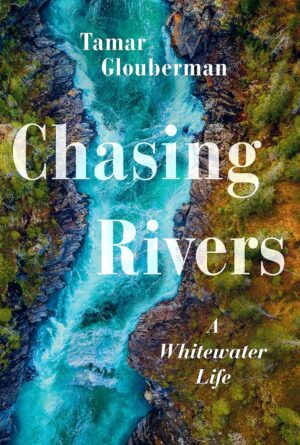Chasing Rivers: A Whitewater Life
by Tamar Glouberman
reviewed by Ophelia John
The concept of freedom turns up in a lot of songs, poems, and other narratives, but as the philosophers say, there’s freedom to and freedom from. A Whitewater Life, Tamar Glouberman’s narrative of a life lived on rivers—and the PTSD that nearly cost her that life—explores both.
There’s freedom from the 9-to-5, freedom from retirement accounts, regular paychecks, and monogamous relationships. There’s freedom to explore remote landscapes relying on your own skills and intuition and those of your teammates, and the freedom to overcome physical fear. And, in one decisive section, there’s the freedom to declare oneself not a victim following a sexual assault.
Glouberman is Canadian, and I first became acquainted with her work more than a decade ago when we crossed paths in the University of British Columbia’s online MFA program. Her sense of humor and wilderness knowledge were already evident on the page—one fictional protagonist, working as a guide for polar-bear tourism in the remote Canadian north, stumbles drunk out of a bar and sees the snowbank move. In a nanosecond, she is sober enough to outrun the bear. Since then, Glouberman has developed a prose style that is by turns wry, funny, self-deprecating, and filled with ironic challenges to herself and others.
A Whitewater Life moves around in time among different rafting trips in various locations, but the story is bookended by two incidents. The first is a car accident in which Glouberman is the driver. After a mechanical failure in the very sketchy company car, Glouberman drives herself and two passengers off a cliff. The others escaped with scratches, but Glouberman was badly injured and left with enduring trauma and guilt for what might have happened to them all.
The second shoe drops later in the story, when one of her clients drowns during a rafting trip. Elderly, with a cancer diagnosis and a tendency to take risks, “Ray” goes over the edge and the emergency services are unable to get there in time. Here is another potential mountain of guilt and pain to climb, and in the final pages, Glouberman addresses the question of how she dealt with this. “Writing this story has brought me understanding,” she writes, “which has cracked the door open to forgiveness. I’m not yet all the way through that door, but I am far enough in to think that perhaps Graham [her boss] was right: Ray was a cool, no-nonsense man and would tell you to let it go.”
To come out on the other side of trauma with humor and strength and the knowledge that, piece by piece, one has rebuilt one’s existence, is to live a big life. To then write about this in all the detail that, as Glouberman notes in her dedication, “no one really wants to know about,” requires a special kind of élan. But the details are what give her story its flavor of freedom, of choice, and of personal courage.
Courage—or straight-up bravery—comes in many forms. A person choosing to take on what she finds difficult in life: that’s one. A person fighting her way back from physical and emotional trauma: that’s another. That same person refusing the identity of victim is a third. Living a life, laughing about it, and sharing it fearlessly: this, dear reader, is what it looks like to have guts. This is what it looks like to be free.
Published on May 5, 2024

